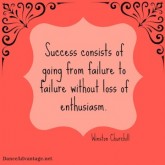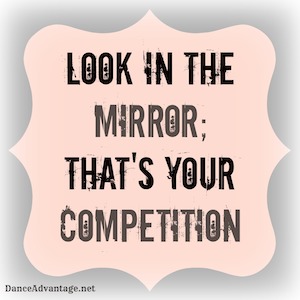All dancers, at one time or another, encounter situations where they feel behind or challenged and start comparing themselves to other dancers. Haven’t you?
When comparisons remain positive, they can help you create a realistic picture and awareness of where you are and where you still have to go. Too easily, comparisons become a negative assault on the self, deterring your progress and undermining your potential.
Despite the title of this article, you need not stop comparison altogether, just the damaging approach you take to it. And you can do that by making a few changes to the way you think and act when you’re in the dance studio.
Remember, Progress is an Individual Process
Expecting perfection, overnight results, or for everything to come naturally leads only to frustration. Your shortcomings, real or imagined, only really matter if you allow them to turn you off your goals.
Every dancer has something they’re reaching for, every dancer has something they’re good at, and every dancer has something to give.
Every moment, at all times.
Many, if not most, great dancers possess a degree of perfectionism. Regular self-analysis and scrutiny can be a very good thing but, this quality can be destructive when dancers let self-criticisms take over and discourage the belief that difficulties can be overcome.
Instead of drowning yourself in unrealistic expectations and destructive comparisons, recall your unique strengths and abilities. These will sustain you through moments of defeat or doubt and allow you to continue striving for those goals that are just out of reach.
You are in control!
If you begin to feel negative thoughts creeping in or start to feel badly about a correction you just received, try a technique called thought-stopping.
Tell yourself to STOP (seriously!). Then replace these thoughts “I am learning,” “I am patient,” “I deserve to succeed.”
Sure, you must leave the comfort of what you already know in order to grow. If you only ever did the things you already do well, you’d never improve. Your job is to accept challenges and trust that you’ll benefit from them.
It’s not always easy, or fun, or comfortable. The hardest part is being willing to fail before you can succeed. When doubt starts to creep in consider this:
Each failure brings you one step closer to success.
Forget Quick Fixes
Get acquainted with TEDD. Not TED Talks, though those are cool, too.
TIME, EFFORT, DESIRE, DILIGENCE.
A dancer’s ability to spend more time and effort on areas in which she is lacking than on the things that give her ego a little boost, separates her from the crowd. It’s not necessary to reduce time spent on strengths, but if you truly desire to improve, put in extra time, diligently working to overcome weaknesses rather than avoiding them.
Have a conference with your dance teacher or mentor and have an open and honest conversation about the areas in which you need the most work. Explain that you are feeling the need to “catch up” with your peers and that you are willing to put in some extra work to improve.
There are rarely quick fixes in dance and a smart and effective dancer knows this. Dancers repeatedly hit plateaus in their development before their next physical or mental “growth spurt”. Don’t give up before that happens!
Apply Observation
Study the strengths and weaknesses of others in an objective manner. “Steal” the actions they’re taking that improve their performance – for example, adding strong dynamics to the movement, sharply spotting turns, executing a deep plié before a jump. Try not to focus on the abilities they’ve got that you don’t. Likewise, learn to observe others’ missteps and uncover them within your own performance. Then, make a note not to repeat them.
Accept Transformation
 Keep in mind, not all weaknesses spell failure. Consider, Bob Fosse, whose own movement habits (some of them less-than-stellar) made their way into his highly-stylized and acclaimed choreography for stage and screen.
Keep in mind, not all weaknesses spell failure. Consider, Bob Fosse, whose own movement habits (some of them less-than-stellar) made their way into his highly-stylized and acclaimed choreography for stage and screen.
Should you stop working on the things that are problematic for you? No, remember, solid technique is important in preventing injury. However, be accepting of where you are, and especially of those unalterable quirks, because these can actually help set you apart.
Develop a Smart Goal Plan
The best way to get beyond comparisons is to focus intently on improving oneself.
Your mentor has helped you define what your goals should be, perhaps he or others can suggest ways to reach these goals.
Make a list of specific steps you’ll take to reach this goal. This breaks down the goal into manageable pieces.
Prepare for the inevitable moment when you lose your focus or motivation. When the going gets tough, what will you (or a friendly supporter you’ve enlisted) do or say to provide the checks and balances you’ll need to move forward?
Take time to reflect. Months later, what did you learn about yourself and your goal? What helped most and what didn’t work for you at all?
Will this help you stop comparing yourself to others?
When is it hardest to battle this bad habit?
























